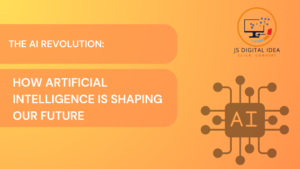The AI Revolution: How Artificial Intelligence Is Shaping Our Future
Artificial intelligence (AI) is no longer a futuristic concept; it’s a rapidly evolving reality that is transforming our world at an unprecedented pace. From self-driving cars and personalized medicine to intelligent assistants and automated factories, the AI revolution is reshaping every aspect of our lives, both individually and societally.

This article delves into the profound impact of AI on our future, exploring its transformative potential across various domains:
Revolutionizing Industries:
- Manufacturing: AI-powered robots are automating production lines, optimizing processes, and improving efficiency. This leads to increased productivity, reduced costs, and the development of innovative products.
- Finance: AI algorithms are analyzing vast datasets to detect fraud, assess risk, and provide personalized financial advice. This leads to enhanced security, improved decision-making, and tailored financial solutions.
- Healthcare: AI is revolutionizing medical diagnosis with machine learning algorithms analyzing medical scans and patient data with remarkable accuracy. This leads to earlier disease detection, personalized treatment plans, and improved patient outcomes.
- Transportation: Self-driving cars are becoming a reality, promising increased safety, reduced traffic congestion, and improved mobility for everyone.
- Retail: AI is personalizing the shopping experience, recommending products based on individual preferences, and optimizing logistics for faster and more efficient deliveries.
Transforming Daily Life:
- Smart Homes: AI-powered devices like smart speakers and thermostats are automating tasks, managing energy consumption, and creating a more comfortable and convenient living environment.
- Personalized Experiences: AI algorithms are tailoring online content, news feeds, and social media interactions to individual preferences, creating a more personalized and engaging digital experience.
- Enhanced Productivity: AI assistants are streamlining daily tasks, scheduling appointments, managing calendars, and providing real-time information, leading to increased productivity and efficiency.
Challenges and Ethical Considerations:
While the potential benefits of AI are vast, the rapid advancement also presents significant challenges:
- Job displacement: Automation through AI has the potential to disrupt the job market, leading to unemployment in certain sectors. Reskilling and upskilling initiatives are crucial to adapting the workforce to the changing landscape.
- Bias and discrimination: AI algorithms can perpetuate existing biases present in the data they are trained on, leading to discriminatory outcomes. Mitigating bias in AI development and deployment is critical to ensure fairness and inclusivity.
- Privacy concerns: The extensive data collection and analysis inherent in AI raise privacy concerns. Robust data protection regulations and transparent data handling practices are essential to protect individual privacy.
- Existential questions: The potential for AI to surpass human intelligence raises profound ethical questions about the future of humanity and the need for responsible development and governance of AI.
Navigating the AI Revolution:
To navigate the AI revolution effectively, we must:
- Promote responsible development: Ethical considerations and human values must be embedded throughout the design, development, and deployment of AI systems.
- Invest in education and training: Upskilling and reskilling initiatives are necessary to prepare the workforce for the changing job market and ensure everyone benefits from the opportunities presented by AI.
- Develop robust regulations: Regulatory frameworks need to be established to address issues like data privacy, algorithmic bias, and accountability for AI-driven decisions.
- Foster global collaboration: International cooperation is crucial to ensure responsible development and deployment of AI that benefits all of humanity.
The AI revolution is upon us, and its impact will continue to shape our future in profound ways. By acknowledging its potential and proactively addressing the challenges, we can harness the power of AI to create a better, more equitable, and sustainable future for all.
Additional Points to Consider:
- The article can be further expanded by including specific examples of AI applications in each domain mentioned.
- Discussing the potential impact of AI on education, entertainment, and the environment can provide a more comprehensive picture.
- Highlighting the ongoing research and development in areas like artificial general intelligence (AGI) and the potential for AI to surpass human intelligence can add another layer of depth.
This article provides a starting point for understanding the transformative nature of the AI revolution and its far-reaching implications for the future of humanity. As AI continues to evolve, it’s crucial to engage in ongoing discussions and collaborations to ensure its responsible development and utilization for the betterment of our world.
